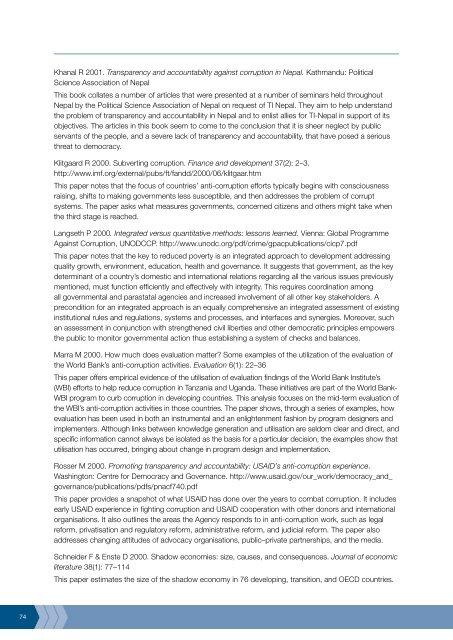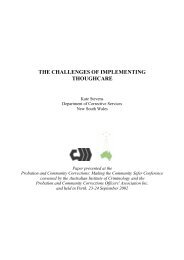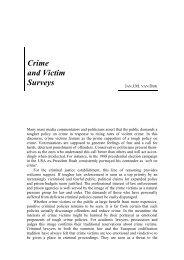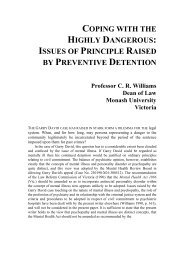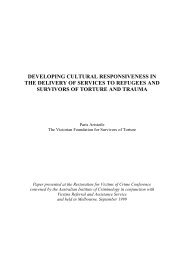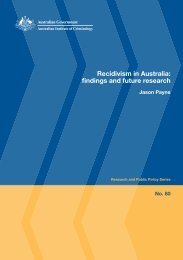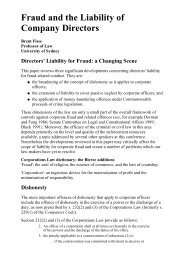Review of anti-corruption strategies Rob McCusker - Australian ...
Review of anti-corruption strategies Rob McCusker - Australian ...
Review of anti-corruption strategies Rob McCusker - Australian ...
Create successful ePaper yourself
Turn your PDF publications into a flip-book with our unique Google optimized e-Paper software.
Khanal R 2001. Transparency and accountability against <strong>corruption</strong> in Nepal. Kathmandu: Political<br />
Science Association <strong>of</strong> Nepal<br />
This book collates a number <strong>of</strong> articles that were presented at a number <strong>of</strong> seminars held throughout<br />
Nepal by the Political Science Association <strong>of</strong> Nepal on request <strong>of</strong> TI Nepal. They aim to help understand<br />
the problem <strong>of</strong> transparency and accountability in Nepal and to enlist allies for TI-Nepal in support <strong>of</strong> its<br />
objectives. The articles in this book seem to come to the conclusion that it is sheer neglect by public<br />
servants <strong>of</strong> the people, and a severe lack <strong>of</strong> transparency and accountability, that have posed a serious<br />
threat to democracy.<br />
Klitgaard R 2000. Subverting <strong>corruption</strong>. Finance and development 37(2): 2–3.<br />
http://www.imf.org/external/pubs/ft/fandd/2000/06/klitgaar.htm<br />
This paper notes that the focus <strong>of</strong> countries’ <strong>anti</strong>-<strong>corruption</strong> efforts typically begins with consciousness<br />
raising, shifts to making governments less susceptible, and then addresses the problem <strong>of</strong> corrupt<br />
systems. The paper asks what measures governments, concerned citizens and others might take when<br />
the third stage is reached.<br />
Langseth P 2000. Integrated versus qu<strong>anti</strong>tative methods: lessons learned. Vienna: Global Programme<br />
Against Corruption, UNODCCP. http://www.unodc.org/pdf/crime/gpacpublications/cicp7.pdf<br />
This paper notes that the key to reduced poverty is an integrated approach to development addressing<br />
quality growth, environment, education, health and governance. It suggests that government, as the key<br />
determinant <strong>of</strong> a country’s domestic and international relations regarding all the various issues previously<br />
mentioned, must function efficiently and effectively with integrity. This requires coordination among<br />
all governmental and parastatal agencies and increased involvement <strong>of</strong> all other key stakeholders. A<br />
precondition for an integrated approach is an equally comprehensive an integrated assessment <strong>of</strong> existing<br />
institutional rules and regulations, systems and processes, and interfaces and synergies. Moreover, such<br />
an assessment in conjunction with strengthened civil liberties and other democratic principles empowers<br />
the public to monitor governmental action thus establishing a system <strong>of</strong> checks and balances.<br />
Marra M 2000. How much does evaluation matter? Some examples <strong>of</strong> the utilization <strong>of</strong> the evaluation <strong>of</strong><br />
the World Bank’s <strong>anti</strong>-<strong>corruption</strong> activities. Evaluation 6(1): 22–36<br />
This paper <strong>of</strong>fers empirical evidence <strong>of</strong> the utilisation <strong>of</strong> evaluation findings <strong>of</strong> the World Bank Institute’s<br />
(WBI) efforts to help reduce <strong>corruption</strong> in Tanzania and Uganda. These initiatives are part <strong>of</strong> the World Bank-<br />
WBI program to curb <strong>corruption</strong> in developing countries. This analysis focuses on the mid-term evaluation <strong>of</strong><br />
the WBI’s <strong>anti</strong>-<strong>corruption</strong> activities in those countries. The paper shows, through a series <strong>of</strong> examples, how<br />
evaluation has been used in both an instrumental and an enlightenment fashion by program designers and<br />
implementers. Although links between knowledge generation and utilisation are seldom clear and direct, and<br />
specific information cannot always be isolated as the basis for a particular decision, the examples show that<br />
utilisation has occurred, bringing about change in program design and implementation.<br />
Rosser M 2000. Promoting transparency and accountability: USAID’s <strong>anti</strong>-<strong>corruption</strong> experience.<br />
Washington: Centre for Democracy and Governance. http://www.usaid.gov/our_work/democracy_and_<br />
governance/publications/pdfs/pnacf740.pdf<br />
This paper provides a snapshot <strong>of</strong> what USAID has done over the years to combat <strong>corruption</strong>. It includes<br />
early USAID experience in fighting <strong>corruption</strong> and USAID cooperation with other donors and international<br />
organisations. It also outlines the areas the Agency responds to in <strong>anti</strong>-<strong>corruption</strong> work, such as legal<br />
reform, privatisation and regulatory reform, administrative reform, and judicial reform. The paper also<br />
addresses changing attitudes <strong>of</strong> advocacy organisations, public–private partnerships, and the media.<br />
Schneider F & Enste D 2000. Shadow economies: size, causes, and consequences. Journal <strong>of</strong> economic<br />
literature 38(1): 77–114<br />
This paper estimates the size <strong>of</strong> the shadow economy in 76 developing, transition, and OECD countries.


